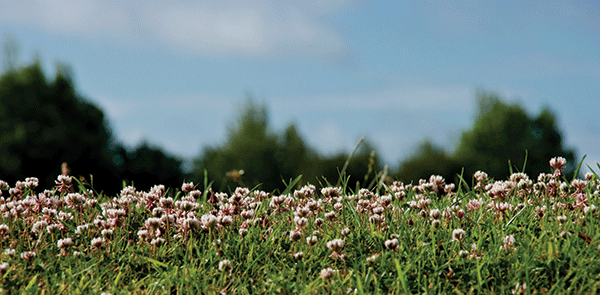Could the future of farming be free of animals? As one of the main drivers of biodiversity loss and carbon emissions, the role of animals is being justifiably scrutinised.
Step in ‘veganic’ (vegan organic) farming, touted by a small but passionate following as a beacon of sustainable and cruelty-free food production, using no animal products or chemicals to grow food.
This would be hard to imagine for many, particularly organic farmers who view animals, and namely their manure, as crucial for restoring fertility to the soil without the use of synthetic fertilisers.
There are a few farmers and growers pioneering this approach, chief among them Iain Tolhurst, who has been farming organically without animals or their manures for 32 years to great success.
He famously appeared on George Monbiot’s anti-meat documentary Cowspiracy, held up as a glowing example of how farming can be done without any animal involvement or chemicals.
Speaking at The Vegan Society’s Grow Green conference earlier this summer, Tolhurst explained how his 18-acre patch of self-proclaimed “mediocre” land on the flood plains in Oxfordshire manages to thrive, producing over 100 different vegetables crops and enough to feed over 175 people and support five permanent staff through his local box scheme.
So, what’s his secret? According to Tolhurst, it’s all about a dedication to flourishing biodiversity and soil health.
“We like to think that the main crop on the farm is biodiversity; the vegetables and the fruit are simply a by-product. The farm functions on the stuff,” he said.
So far, so feasible. But it soon became apparent there is a little more to it, when he explained the seven-year field rotation, and nine-year garden rotation needed to ensure that soil fertility is kept at optimum. A rotation is the pattern of different crops that farmers grow to balance the nutrients in the soil year after year.
Tolhurst also uses a complex web of ecological features designed to maintain abundant biodiversity and soil health without additional help from animal manure, such as beetle banks, woodchip compost and green manures.
These green manures are crops such as clover and legumes, and are among an organic (and veganic) farmer’s most essential tools, as they draw the all-important fertilising nitrogen from the atmosphere, transferring it into the soil.
“Green manure is one of the main feeders of the soil,” said Tolhurst. “We grow it not as a fertiliser but as a soil food; it enables us to recycle all the nutrients from the farm.
This article was originally published in the Wicked Leeks summer 2021 issue. You can read the full magazine for free on Issuu here.
“We can get nitrogen from the air and we’re able to show that green manures have a huge impact on biodiversity. It’s not just about feeding soil but about feeding biodiversity.”

While the principles that Tolhurst follows are not exactly revolutionary, especially to those already farming in a nature-friendly or organic way, replacing the fertility that animals provide means that he has to take meticulous care in nurturing all parts of his system.
The method, according to Tolhurst, also “has a very low carbon footprint because you’re not importing manures and composts from other farms,” pointing to the carbon-heavy nature of animal agriculture and the fact UK standards permit the use of non-organic manures in organic systems.
Despite the enthusiasm of some successful adopters, and a desire on the part of vegans who would like to eat without any animal inputs, veganic farming has yet to pick up steam; there are only 22 producers who are part of the Vegan Organic network in the UK and Ireland.
And although it has an undeniably low impact, others question whether avoiding animals altogether could detract from other pressing issues.
“Is that really the question we need to be asking? We need to ask what is the transition we want: from industrial to highly diverse [farming systems] that nurture ecosystems,” said Nick Jacobs, director of International Panel of Experts on Sustainable Food Systems (IPES), in another session discussing the topic at Grow Green.
“There’s a risk that if we focus disproportionately on animals and in generic terms about animal agriculture, that we miss the fact that there are some specific animal and plant farming systems that are the problem.”
This chimes with supporters of small scale, organic animal production who argue livestock can be sustainable, and even vital, in maintaining healthy ecosystems and rural livelihoods. “Organic farming is very sensitive to place,” said Chris Atkinson, board member of trade body IFOAM Organic Europe. “In a lot of places, livestock does play a role in supporting organic systems.”
With still only 2.8 per cent of UK land farmed organically, the further step to veganic farming suggests that it might be one step too far to represent a widespread solution. But ultimately, we will need every tool in the box to reverse the climate and biodiversity crises.
And while the transformation needs to scale up rather than splinter, there is undoubtedly still much to learn from the skill and self sufficiency of farmers such as Tolhurst and others in the veganic movement.
This article was originally published in the Wicked Leeks summer 2021 issue. You can read the full magazine for free on Issuu here.












A really important discussion! Okay we can have some organic livestock to provide the manure but won’t a lot of farms have to do without chemicals OR manure?